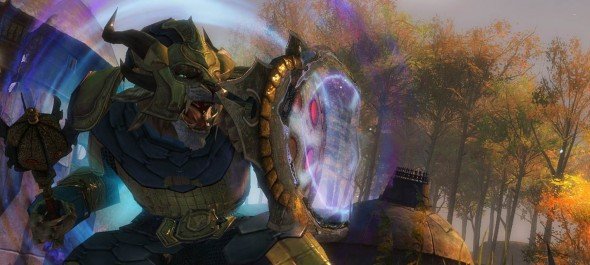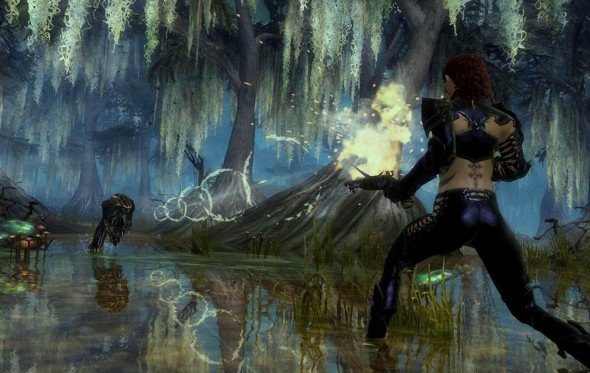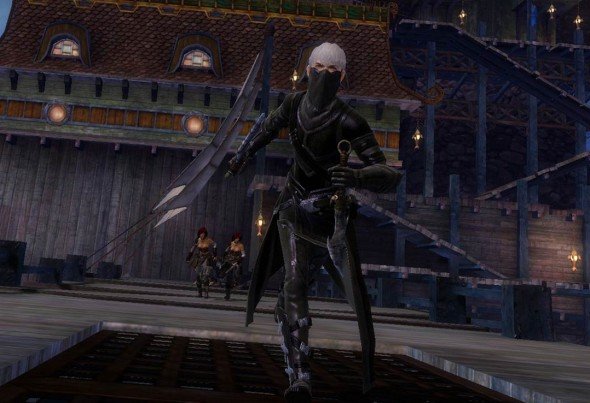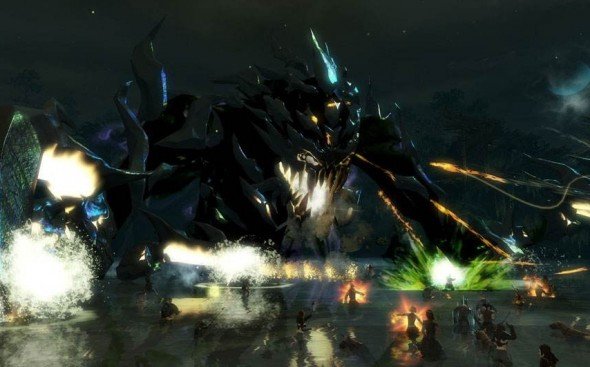Games of 2012 - Guild Wars 2

As the MMO coalesced into its modern form, quirks that were initially necessary compromises became widely-accepted features. Mute characters that embody utility rather than personality; quest objectives that only relate tangentially to the story that frames them; raid bosses designed to be killed and killed again by the same groups of people. Good games have been made – and are being made – on those principles, but it's hard to argue that they're sacred cows. Instead, they're the elephants in the room that Guild Wars 2 is setting out to slay.
“MMOs aren't always great RPGs,” says Eric Flannum, lead game designer. “Most MMOs try to set a tone for the world, but they don't necessarily try to tell you a story about your character.” Guild Wars 2 isn't alone in placing renewed emphasis on the player's story, but it is making the most comprehensive array of changes to the way the MMO functions in order to do it. Everything from quests – sorry, events – to guilds and grouping has been rethought in order to create the most dynamic and finely crafted experience.
On the surface, however, Guild Wars 2 doesn't look like a wholesale rejection of what has come before. Quite the contrary: this is a game of action bars, inventory screens and objective trackers whose major breaks from tradition sneak up on you gradually over the course of gameplay.

You'll realise that the objectives popping up in the top-right of the screen aren't quests you've accepted but dynamic events occurring in the world around you. Then you'll realise that the marker above an NPC isn't an indicator that he's got a shopping list, but a simple way of drawing attention towards a particular place where something cool is going to happen.
Guild Wars 2 will provide you with a personal storyline derived from your choice of race and background, but the majority of your experience is dictated by how you respond to a world that's constantly changing. Event chains, while mostly confined to individual zones, are designed to interact with each other in such a way that you're unlikely to ever encounter the same place in the same way. Rather than the emergent unpredictability of something like EVE, it's a way of creating a living world without sacrificing the advantages of a handcrafted challenge.
During my time with the game, I found myself battling alongside another player and receiving increased rewards without grouping or sharing quests. Rather than needing to find other players to see the more difficult content, Guild Wars 2's guilds will form organically. “We look at a persistent world as a way to go out and meet people,” says Eric Flannum. “Our world encourages people to play together... they will eventually communicate, then they'll develop long-term relationships and guilds will support that.”

Increasingly, PVP systems operate outside of normal play: battlegrounds with their own rules and conditions that sometimes feel like a different game entirely. Rather than attempt to mask the distinction, it's something that Guild Wars 2 makes explicit.
The biggest gaming news, reviews and hardware deals
Keep up to date with the most important stories and the best deals, as picked by the PC Gamer team.
“We look at it more the way you would an RTS,” Flannum explains. “The singleplayer and multiplayer are basically the same game but the singleplayer has this rich story because that's what players are looking for, and the multiplayer's just very convenient to jump in and out of.”
“We're trying to facilitate the community that will develop around PVP,” Flannum says. “You join a match by going to a lobby area, so you're going to see other players that are trying to join games practising their builds and things like that, and you'll get talking to them in there.”
Rather than waiting in a queue, a FPS-style browser allows players to keep track of their favourite servers and the places their friends are playing. “What we expect to happen is a similar thing to Team Fortress or Call of Duty, where you play on the same server consistently and you start to see the same people over and over again.”

MMO communities are notorious for mapping out and documenting every inch of the games they play: a task that won't be easy with Guild Wars 2, according to Flannum. “We never underestimate the ability of players to do things we don't expect, but they can't ruin the experience for other players and they don't have to do that in order to get rewards.”
An MMO that can be enjoyed without one eye on the 'right' way to build your character, and that doesn't simply accept the absurdity of queuing for a monster as a matter of course, is an exciting prospect.
“We're having to overcome a lot of the preconceived notions and the training that people have got from other MMOs,” says Flannum, describing a player's experience of Guild Wars 2 as a process of gradual discovery. “They'll go in comfortable with the situation, and then start noticing the differences and saying 'I'm playing this game in a entirely different way than I'm used to' – and that's cool, right?
Joining in 2011, Chris made his start with PC Gamer turning beautiful trees into magazines, first as a writer and later as deputy editor. Once PCG's reluctant MMO champion , his discovery of Dota 2 in 2012 led him to much darker, stranger places. In 2015, Chris became the editor of PC Gamer Pro, overseeing our online coverage of competitive gaming and esports. He left in 2017, and can be now found making games and recording the Crate & Crowbar podcast.


